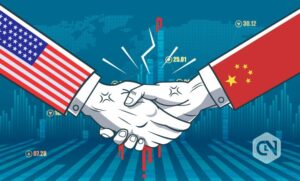In today’s interconnected world, the global economy is a complex web of interdependencies. Among the many players in this economic arena, China stands out as a colossal force that significantly affects the United States’ economic landscape. As the world’s most populous country and the second-largest economy, China’s economic policies, trade practices, and financial maneuvers have profound implications for the United States. In this comprehensive blog post, we will explore the multifaceted ways in which China affects the US economy and why it matters.
Trade Relations
China is the United States’ largest trading partner, and the economic ties between these two giants are extensive. The trade relationship is often a subject of both praise and contention. Let’s delve into the key aspects of this intricate relationship:
Trade Deficit
One of the most significant aspects of China’s influence on the US economy is the trade deficit. The US consistently imports more goods from China than it exports, resulting in a trade deficit. This deficit can strain domestic industries, lead to job displacement, and impact the overall balance of trade. Critics argue that the trade deficit weakens the US economy, while proponents emphasize the benefits of access to affordable goods for American consumers.
Tariffs and Trade Wars
Over the years, tensions have arisen between the US and China regarding trade practices. Tariffs have been imposed on each other’s goods, leading to trade wars that have disrupted markets and raised costs for businesses and consumers. The ebb and flow of these trade disputes have a direct impact on the US economy, affecting industries such as agriculture, technology, and manufacturing.
Supply Chain Dependency
A Chinese translator told me the US economy has become increasingly reliant on Chinese manufacturing and supply chains. This dependency has become especially evident in the wake of the COVID-19 pandemic, as disruptions in the supply chain highlighted vulnerabilities. Many US companies source components or finished goods from China, making them susceptible to disruptions caused by geopolitical tensions or natural disasters.
Intellectual Property and Technology Transfer
The issue of intellectual property theft and technology transfer has been a contentious one in US-China relations. Concerns have been raised about China’s practices, such as forced technology transfer, intellectual property theft, and unfair competition. These practices can stifle innovation and competitiveness in the US technology sector, which is a vital driver of the American economy.
Investment Flows
China’s influence extends to the realm of investment. Chinese investors have poured billions of dollars into the US, investing in businesses, real estate, and financial assets. This has the potential to boost the US economy by providing capital and creating jobs. However, it also raises concerns about national security and the influence of foreign entities on US businesses.
Currency Manipulation
China has been accused of manipulating its currency, the yuan, to gain an advantage in international trade. This practice can affect the competitiveness of US exports and has led to disputes between the two nations. Currency manipulation can also impact the global financial markets, causing uncertainty and volatility.
Energy and Natural Resources
China’s voracious appetite for energy and natural resources has global repercussions, including effects on the US economy. China’s demand for commodities like oil, coal, and metals can influence global prices and markets. This can impact US energy producers and resource exporters, creating opportunities and challenges for the US economy.
Geopolitical Considerations
The US-China relationship is not limited to economics; it also has significant geopolitical dimensions. Tensions in the South China Sea, cybersecurity concerns, and human rights issues can spill over into economic relations. These geopolitical factors can have a direct impact on trade and investment between the two nations.
Conclusion
China’s influence on the US economy is undeniable and multifaceted. As the world’s second-largest economy and a major trading partner, China’s policies and practices have far-reaching implications for the United States. The trade deficit, supply chain dependency, intellectual property issues, investment flows, currency manipulation, energy demand, and geopolitical tensions all play a role in shaping the economic relationship between these two nations.
It is essential for the United States to navigate this relationship carefully, balancing economic interests with national security and strategic considerations. Engaging in constructive dialogue and negotiation is key to addressing the challenges and opportunities presented by China’s role in the global economy.
As we move forward in this dynamic landscape, understanding the complexities of the US-China economic relationship will be vital for policymakers, businesses, and individuals alike. The interplay between these economic giants will continue to shape the trajectory of the global economy in the years to come.


